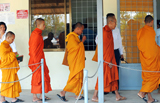Lawyers for the former chief torturer of Cambodia’s genocidal Khmer Rouge yesterday requested his release from prison, one day after he made a historic public apology and admitted guilt before a UN-backed tribunal.
Kaing Guek Eav, known by his revolutionary alias Duch, faces charges of crimes against humanity, torture, premeditated murder and breaches of the Geneva Conventions, but defense lawyers said his almost 10 years of pre-trial detention violated international law and the Cambodian Constitution.
“Based on the facts, on Cambodian law and international precedents, there is no legal basis for the pre-trial detention,” Duch’s French Lawyer Francois Roux said. “His detention should have only lasted three years.”

PHOTO: AFP
Roux said his client should be released for the duration of his trial, which began on Monday and is expected to run until mid-July, and transferred to a “safe house.”
In the first trial before the tribunal, the 66-year-old former mathematics teacher faces a maximum sentence of life in prison for crimes he allegedly committed as head of the notorious Tuol Sleng torture prison in Phnom Penh during the ultra-Maoist regime’s 1975 to 1979 reign.
Duch on Tuesday begged his victims, their families, and the country for forgiveness, declaring he was responsible for thousands of deaths for which he felt “heartfelt sorrow.”
“May I be permitted to apologize to the survivors of the regime and the families of the victims who had loved ones who died brutally,” he said. “I ask them to please open a window and let me ask for forgiveness.”
It was the first time any Khmer Rouge leader or apparatchik had made such an apology.
Duch is one of five former Khmer Rouge leaders facing trial for the deaths of up to 2 million people who were executed or died of starvation or overwork as the fanatical regime sought to transform Cambodian society into a socialist utopia and erase history.
Cambodian co-prosecutor Chea Leang argued that Duch should not be released from detention because his personal safety would be at risk and social order would be jeopardized.
Duch sat impassively through yesterday morning’s session, occasionally taking notes and gazing into the 500-seat public gallery.
Toch Mom, a 50-year-old Buddhist monk who came to watch the trial said he believed Duch’s apology was genuine.
“I believe he is telling the truth when he says he’s sorry,” he said. “I lost six family members because of the Khmer Rouge, so I am here to see justice in action.”
Earlier this week the court was told that prisoners were routinely tortured, shackled in tiny cells for almost 24 hours a day, were not permitted to speak unless being interrogated, received barely any food and were “forced to urinate in jerry cans and defecate in ammunition boxes.”
More than 12,000 men, women and children were tortured at the prison and most were sent to be murdered at the Cheong Ek “Killing Fields.”

Indonesia yesterday began enforcing its newly ratified penal code, replacing a Dutch-era criminal law that had governed the country for more than 80 years and marking a major shift in its legal landscape. Since proclaiming independence in 1945, the Southeast Asian country had continued to operate under a colonial framework widely criticized as outdated and misaligned with Indonesia’s social values. Efforts to revise the code stalled for decades as lawmakers debated how to balance human rights, religious norms and local traditions in the world’s most populous Muslim-majority nation. The 345-page Indonesian Penal Code, known as the KUHP, was passed in 2022. It

‘DISRESPECTFUL’: Katie Miller, the wife of Trump’s most influential adviser, drew ire by posting an image of Greenland in the colors of the US flag, captioning it ‘SOON’ US President Donald Trump on Sunday doubled down on his claim that Greenland should become part of the US, despite calls by the Danish prime minister to stop “threatening” the territory. Washington’s military intervention in Venezuela has reignited fears for Greenland, which Trump has repeatedly said he wants to annex, given its strategic location in the arctic. While aboard Air Force One en route to Washington, Trump reiterated the goal. “We need Greenland from the standpoint of national security, and Denmark is not going to be able to do it,” he said in response to a reporter’s question. “We’ll worry about Greenland in

PERILOUS JOURNEY: Over just a matter of days last month, about 1,600 Afghans who were at risk of perishing due to the cold weather were rescued in the mountains Habibullah set off from his home in western Afghanistan determined to find work in Iran, only for the 15-year-old to freeze to death while walking across the mountainous frontier. “He was forced to go, to bring food for the family,” his mother, Mah Jan, said at her mud home in Ghunjan village. “We have no food to eat, we have no clothes to wear. The house in which I live has no electricity, no water. I have no proper window, nothing to burn for heating,” she added, clutching a photograph of her son. Habibullah was one of at least 18 migrants who died

Russia early yesterday bombarded Ukraine, killing two people in the Kyiv region, authorities said on the eve of a diplomatic summit in France. A nationwide siren was issued just after midnight, while Ukraine’s military said air defenses were operating in several places. In the capital, a private medical facility caught fire as a result of the Russian strikes, killing one person and wounding three others, the State Emergency Service of Kyiv said. It released images of rescuers removing people on stretchers from a gutted building. Another pre-dawn attack on the neighboring city of Fastiv killed one man in his 70s, Kyiv Governor Mykola